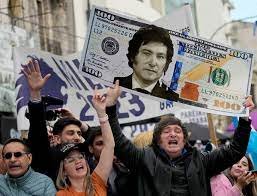
Argentina, a realm renowned for its intricate tapestry of historical richness and cultural diversity, has recently etched its presence onto the global stage with unprecedented vigor. At the epicenter of this seismic shift lies none other than the freshly inaugurated helmsman, President Javier Milei, an unapologetic torchbearer of anarcho-capitalist principles. As the nation traverses uncharted political terrain, imperative scrutiny beckons, delving into the economic ethos now molding its destiny—a symphony orchestrated by anarcho-capitalism.
Argentina’s Political Matrix: An Epochal Paradigm Shift
Within the annals of a nation teetering on the precipice of a tumultuous political past, an architect of a distinct vision has ascended to the fore. President Javier Milei’s audacious proclamation as an anarcho-capitalist ushers in an unprecedented chapter in Argentina’s political narrative. The intricate ballet between politics and economic doctrine now takes center stage, casting a luminous spotlight on the unfolding drama.
Deciphering Anarcho-Capitalism: A Plunge into Libertarian Tenets
Anarcho-Capitalism Illuminated
Anarcho-capitalism, an amalgam of political and economic philosophy steeped in libertarian ideals, unfurls its tapestry. It champions a society devoid of a centralized government, extolling the virtues of individual liberty, voluntary collaboration, and unfettered markets. In the void left by the absence of state intervention, anarcho-capitalists posit that social order can be meticulously maintained through private property rights and contractual agreements.
The Underpinnings of Anarcho-Capitalism
Rooted in classical liberal ideologies, anarcho-capitalism draws inspiration from luminaries such as Ludwig von Mises and Murray Rothbard. Aligned with the non-aggression principle, it vehemently asserts the inherent wrongness of initiating force or coercion. Instead, anarcho-capitalists champion the resolution of disputes through voluntary, market-driven mechanisms.
Javier Milei: A Vanguard of Anarcho-Capitalism

Javier Milei, a seasoned economist at 53, emerges as the vanguard of this distinctive amalgamation of political ideology and economic philosophy. His journey from a scholarly advocate of anarcho-capitalism to the zenith of Argentina’s political hierarchy underscores the shifting tides in the global political sea.
Milei’s Ascent to Power: An Anarcho-Capitalist Odyssey
The ascent of Milei to the presidency unfolds against a backdrop of fervent advocacy for anarcho-capitalist ideals. His unwavering commitment to curbing government intervention in the economy and fostering a conducive environment for commerce resonates profoundly with a significant cross-section of the Argentine electorate.
Public Reverberations and Critiques: A Landscape in Flux
Yet, akin to the seismic tremors accompanying any profound political transition, Milei’s presidency engenders a symphony of diverse reactions. Advocates extol his championing of individual liberties and free markets, hailing him as a standard-bearer of minimal government. Conversely, dissenting voices articulate concerns regarding the pragmatic feasibility of implementing anarcho-capitalist ideals on a national canvas.
Anarcho-Capitalism: A Global Vantage Point
The reverberations of Milei’s presidency transcend Argentina’s borders, beckoning global interest and scrutiny. The fusion of libertarian principles with executive authority constitutes a rare tableau, catalyzing discussions regarding the practicability of anarcho-capitalism in grappling with contemporary challenges.
Global Intrigue in Miles’s Stewardship: A Novel Political Odyssey
The international gaze intensifies as Milei assumes the mantle of leadership. His presidency metamorphoses into a global experiment, scrutinizing the viability of anarcho-capitalist ideals on a national scale. The sui generis blend of political philosophy and governance piques the curiosity of political theorists, economists, and denizens alike.
Debates Encircling Anarcho-Capitalism: Viability and Ramifications
The term “anarcho-capitalism” not only reverberates within Argentina but also resonates within the broader intellectual echelons. As Milei navigates the labyrinthine intricacies of governance, debates surrounding the feasibility and repercussions of anarcho-capitalism attain a heightened crescendo. The discussions delve into its potential to grapple with contemporary challenges and the impediments it may encounter in practical implementation.
Challenges and Contemplations: A Candid Appraisal
The coherence of anarcho-capitalism, especially in addressing quandaries like wealth inequality and social welfare, remains under the microscope. Critics posit that while theoretically robust, the philosophy may encounter stumbling blocks in actual application. The delicate equilibrium between individual freedoms and societal well-being emerges as a pivotal consideration in this unexplored domain.
Coherence of Anarcho-Capitalism: A Rigorous Scrutiny
While Milei proudly wears the mantle of an anarcho-capitalist, skeptics question the coherence of philosophy in navigating the complexities of modern society. The potential pitfalls and challenges in negotiating economic disparities without government intervention become focal points in this rigorous examination.
Economic Renaissance or Precarious Gambit?
As President Milei unfurls the banner of anarcho-capitalist policies, the world observes with bated breath. Can his approach kindle an economic renaissance, or does it harbor risks capable of exacerbating existing challenges? The stakes are lofty, and the denouement will, undoubtedly, etch indelible imprints on perceptions of the practicality of anarcho-capitalism.
The Uncharted Odyssey Awaits

Argentina’s decision to anoint an anarcho-capitalist president thrusts the philosophy into the global limelight. Javier Milei’s presidency evolves into a litmus test, providing sagacious insights into the viability of anarcho-capitalism on a national canvas. As the globe witnesses this unprecedented political and economic experiment, the implications of anarcho-capitalism may extend far beyond Argentina’s geographic confines.
Within the dynamic terrain of global politics, Milei’s presidency bequeaths a new chapter to the ongoing dialogue surrounding the equilibrium between individual autonomy and the state’s role in sculpting a nation’s destiny. The uncharted odyssey ahead beckons introspection, analysis, and collective exploration of potential trajectories for nations contemplating analogous ideological shifts.











Comments 1